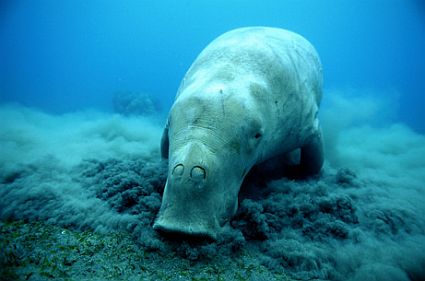
When I saw its picture, this rare and unusual animal fascinated me. A relative of a manatee even dubbed a mermaid, its remnant population is threatened by environmental degradation and occasional entanglement mortality in fishing nets, but now the military seems to have become its tormentor.
The U.S. military has maintained a sturdy presence in Okinawa since World War II, with more than 30,000 personnel currently stationed on the island. The Center for Biological Diversity has been leading a lawsuit against the U.S. Department of Defense. Its main objection is to the planned relocation of the Marine Corps’ Futenma Airbaseto the shoreline in Camp Schwab. The project will require expanding runways into the bay which will result in filling in a large area of ocean near Henoko in order to expand Camp Schwab.
Okinawa: Prime dugong habitat in Japan
This region has often been called the ‘Galapagos of the East.’ Fewer than 50 individual dugongs remain in an area described by the United Nations Environment Program as ‘the most important known dugong habitat in Japan.’ Okinawa is the largest of the Ryukyu Islands, an archipelago that stretches from Japan’s southern island of Kyushu to Taiwan.
Okinawa’s Henoko Bay is fed by the tropical hot waters of the Kuroshio Ocean current, the region helps bolster 400 different species of coral and supports the nutrient rich seagrass beds upon which the Okinawa dugong feeds. More than 1,000 species of reef fish, marine mammals, and sea turtles (inclusive of the endangered hawksbill, loggerhead, and green turtle) also live among Okinawa’s reefs and seagrass beds.
Dugong at stake
This dugong, is one of four extant members of the order Sirenia, a group of marine mammals that scientists believe evolved from elephants about 60 million years ago,the only fully-aquatic herbivorous mammals, it feeds in the seagrass beds and coral reefs of Okinawa’s Henoko Bay. Dugongs play a central role in the culture and mythology of Okinawa, Galvin said. The animals are associated with creation and mermaid myths and are considered harbingers of natural disasters such as tsunamis.
If the U.S. military proceeds with its Camp Schwab construction plan this exceptional, rare animal, will lose the best habitat it has left and begin its last slide toward extinction. It will also result in rampant dis-respect for the environmental value of ocean eco-systems. Even if the lawsuit is successful, stopping the base expansion is not enough to save the Okinawa dugong, we need to do more!
Image credit: Pete Atkinson/Getty Images
Source: National Geographic


